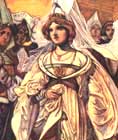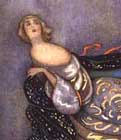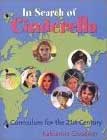
Cinderella:
345 Variants
by Marian
Roalfe Cox
SurLaLune's
Cinderella Area
SurLaLune Fairy Tales Main Page
177
Luzel, Contes populaires de Basse-Bretagne. Paris, 1887. Vol. iii, l 247-261. No. V. (Told by Barbe Tassel, Plouaret, 1869.)
"LA FILLE DU ROI D'ESPAGNE."
ABSTRACT
Deceased wife's resemblance and wedding clothes marriage test--Unnatural father--Old woman aid--Counter-tasks--Magic dresses--Heroine disguise (as servant)--Heroine flight--Menial heroine (swineherd)--Heroine discovered thrice in forest by hunting lord; she doffs magic dress ere he reaches her--Young lord hides at neighbouring farm, goes to bed in dark corner, and feigns to be poor sick woman; farmer's wife does his bidding. He is visited in turn by three young ladies from castle, one of whom he was to select as bride. Each makes confession to him; the first has abandoned her one child, the second her two children, the third her three children. Fourth day swineherd brings food from castle; tells supposed old woman who she is. Young lord goes home; sups alone with three young ladies, flogs them, denounces them, sends them to their homes. Calls swineherd, tells of her revelation to him--Happy marriage.
TABULATION
(1) King of Spain, in his grief at wife's death, vows to himself never to marry again, unless he can find someone exactly like her, and who can wear her wedding clothes.-- (2) His daughter, aged eighteen, is just like mother, and, one day in play, puts on wedding clothes, which fit her perfectly. Father embraces her, crying, "My wife! I have found my wife again." He seeks to marry her.-- (3) In her distress, she consults old woman dwelling in hut in forest near, who bids her ask father for dress like the stars. This he at length procures; and, after long seeking, finds, in turn, dress like the moon and dress like the sun.-- (4) Heroine must now put dresses in box, and escape at night from father's house. She sets out, clad like a working-girl. King sends soldiers after her, but she hides under arch of bridge while they pass by. She reaches castle, and asks lodging for the night. They take her in, out of pity.-- (5) Next day she begs to be retained as servant, and is engaged to tend swine. She spends each day in the woods surrounding castle. - She carries box about with her, and one day puts on star dress.-- (6) The young lord of the castle, who is hunting in forest, catches sight of her, and hurries towards her. But she has seen him approaching, and hastily doffs dress, and hides box in the thicket. When he comes up he only finds swineherd.-- (7) Next day she dons moon dress, and disappoints him in same way. He asks her if she did not see beautiful princess just now; she says no.-- (8) Next day she dons sun dress, and the birds in trees overhead hop about, singing with joy, and even the swine grunt in admiration. Young lord, who has been watching her from behind tree-trunk, runs towards her, but trips and falls into ditch hidden by ferns and long grass. Heroine has just time to doff dress before he reaches her, and he returns home planning means to unravel the mystery.-- (9) His mother is anxious for his marriage, and three young girls are invited to spend a few days at the castle. The evening they are to arrive he takes his gun, and says he will shoot game for them. But he goes straight to farm-house on the skirts of the wood, and asks farmer's wife to allow him to pass three or four days and nights in a bed under stairs where daylight cannot enter. She offers him rather a feather-bed in best room, which fire declines. He tells her to go next morning to castle and beg a little fresh broth for poor beggar-woman, to whom she is giving shelter. If asked whether she has seen him, she must say no. Woman does as bidden. At the castle they inquire about young lord, and she says she has not seen him.--(10) One of the three visitors returns with her, wishing to see sick woman. Lady wants a light. This is not permitted. She asks supposed beggar-woman how she is, and is answered in a feeble voice, that she is certainly dying, and that what troubles her the most is that for want of care she has let her child die. Young lady says that must not trouble her; she herself had a child, and no one knew of it. She gives beggar a piece of gold.-- (11) Next day, when farmer's wife fetches broth from castle, another of the young ladies returns with her. Same Conversation takes place, and young lady confesses she has had two children, and has let them both die. She gives sick person two pieces of gold.-- (12) Next day third young lady comes, and says she has had three children, and let them all die. She gives him three pieces of gold.-- (13) Next day he bids farmer's wife go for the last time to castle, and ask for basket of salad, as well as for the broth, and get the swineherd to carry it to farm. Heroine, too, wants to see sick person. He tells her the same thing about abandoned child. She exclaims, "Alas! were you married?" "No!" "Heavens! and I-- who am the daughter of the King of Spain-- I left my father's palace clad like a servant, and have made myself a swineherd, all to escape falling into sin. But Cod is good; pray for pardon." And she goes.-- (14) Then young lord gets up in high glee, kills a partridge, and goes home. His mother falls on his neck; the three girls do likewise. He has partridge cooked, and tells mother he wants to sup alone in his own room, with the three girls. He cuts bird into six pieces, gives one to first lady, two to second, and three to third. The third supposes he prefers her, and will marry her. Then he proposes dancing. They say there is only one gentleman to dance with, and no fiddler to play for them. "Here is something that will make you dance, you heart less, unnatural mothers!" says he, taking a whip from a nail on the wall. And he begins to lash the young ladies till they cry for pity. He says, did they show pity to their children when they let them die in secret--"You one, you two, you three." They say it is not true, but he tells them how he heard of it, and bids them return at once to their homes.-- (15) Then he sends for heroine, and tells her to confess who she is, for he knows she is other than she seems. She says she is a poor girl, without father or mother, obliged to work for her maintenance, etc. He tells her how he learnt the truth from her own lips.-- (16) They are married, and the King of Spain is bidden to the feast.
Cox, Marian Roalfe. Cinderella: Three Hundred and Forty-five Variants of Cinderella, Catskin, and Cap O' Rushes, abstracted and tabulated. London: David Nutt for the Folklore Society, 1893.
While the original text of this book is out of copyright, the special formatting and compilation available on SurLaLune Fairy Tales is copyrighted. Be aware that while the original content has been honored, page numbering, footnote numbering, redesigned charts, links, and other aspects are unique to this site's version of the text. Use at your own risk. For private and fair use educational purposes only.
©Heidi
Anne Heiner, SurLaLune Fairy Tales
E-mail: surlalune@aol.com
Page last updated February 1, 2006
www.surlalunefairytales.com










